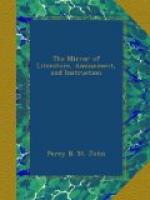Deal.
R.A.
[10] Bernard Barton.
* * * * *
THE SELECTOR; AND LITERARY NOTICES OF NEW WORKS.
PURSUIT OF KNOWLEDGE UNDER DIFFICULTIES.
(Library of Entertaining Knowledge, vol. viii.)
The concluding portion of this volume has lately appeared, and is entitled to equal commendation with its predecessors. Among the most important of the anecdotical lives are, Roger Bacon, Herschel, Watt, and Arkwright—names nearly and dearly allied with the triumphs of science in this country. In Arkwright’s Memoir are some important as well as interesting particulars of the Cotton Manufacture in England. Our quotation is, however, from another portion of the volume, illustrating, as we conceive it does, a species of character which can scarcely be estimated in too amiable a light.
The wonderful Robert Walker, as he is still called in the district of the country where he resided, was curate of Seathwaite in Cumberland during the greater part of last century. The fullest account that has appeared of Mr. Walker is that given, in the notes to his series of sonnets entitled “The River Duddon,” by Mr. Wordsworth, in whose poem of the Excursion the worthy clergyman is also noticed with the commendations due to his singular virtues. From this memoir it appears that Walker was born in the parish of Seathwaite in 1709; that being of delicate constitution, it was determined by his parents, whose youngest child he was, to breed him a scholar; and that accordingly he was taught the elements of reading, writing, and arithmetic by the clergyman of the parish, who also officiated as schoolmaster. He afterwards contrived to acquire a knowledge of the classics; and, becoming in this manner qualified for taking holy orders, was ordained, and appointed to the curacy of his native parish, which was at this time (about the year 1735) of the value of five pounds per annum. On obtaining possession of this living Walker married, his wife bringing him what he calls himself, in one of his letters, “a fortune” of forty pounds. We must refer to Mr. Wordsworth’s pages, and the documents which will be found printed there, for a detail of all that the industry and economy of the curate and his wife contrived to accomplish upon these scanty resources. Suffice it to say, that about twenty years after Walker’s entrance upon his living we find its value, according to his own statement, increased only to the amount in all of seventeen pounds ten shillings. At a subsequent period it received a further augmentation, to what amount is not stated; but it was not considerable. Before this Mr. Walker had declined to accept the adjoining curacy of Ulpha, to be held, as proposed by the bishop, in conjunction with that of Seathwaite, considering, as he says himself, that the annexation “would be apt to cause a general discontent among the inhabitants




